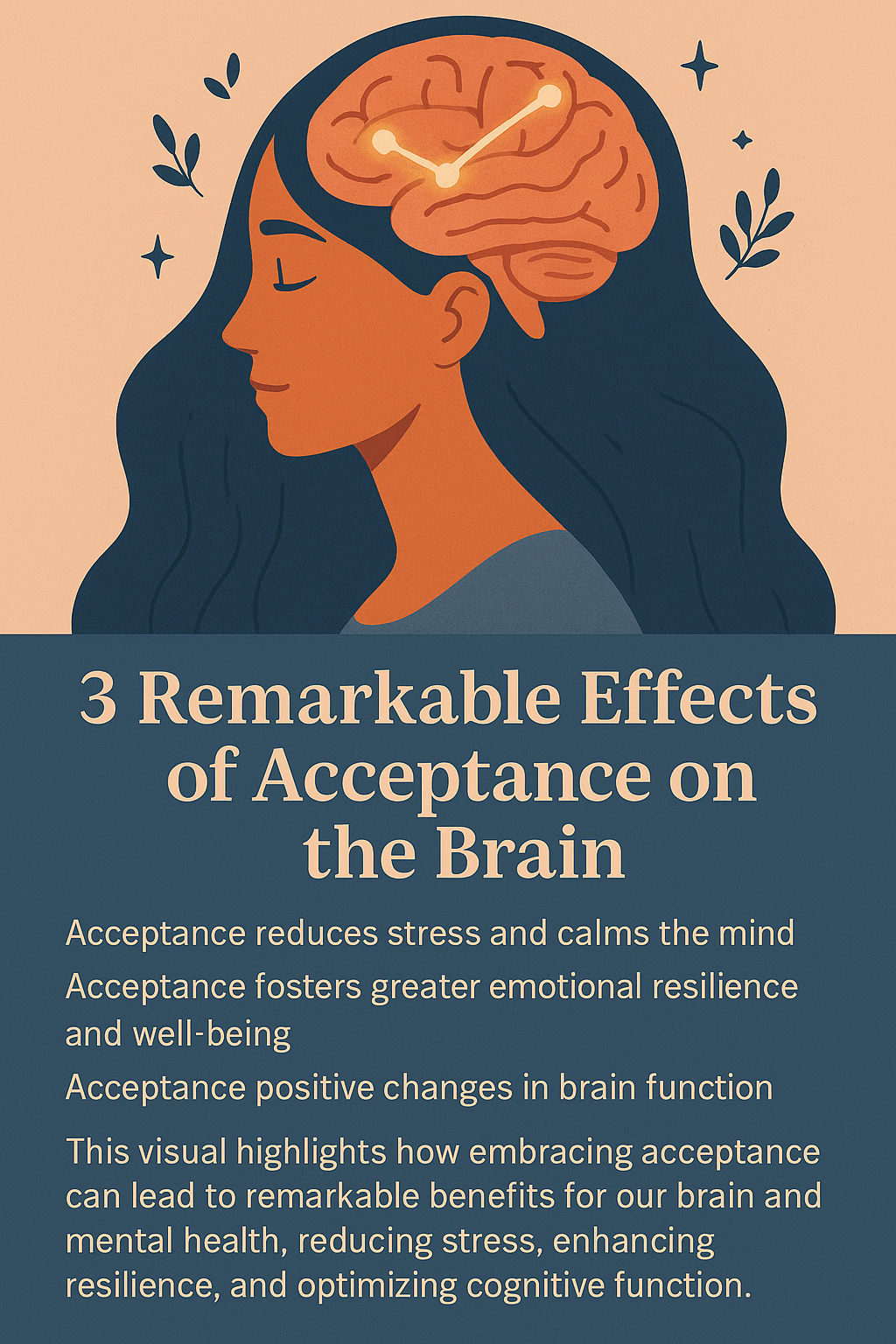
Acceptance and the Brain: 7 Powerful Ways Denial Harms Your Mental Health
Why Acceptance Changes the Brain
In the fast-paced modern world, we often encounter experiences beyond our control. Whether it’s a failed relationship, job loss, or unexpected health condition, our ability to accept the situation has a profound impact on our mental and neurological health. Acceptance is not just a philosophical idea—it’s a scientifically backed approach that rewires the human brain. This blog explores how acceptance affects neural pathways, what happens to the brain when acceptance is missing, and why embracing situations can be the turning point in emotional well-being.
Understanding Acceptance and the Brain’s Response
The act of accepting a situation—especially one that is painful or uncomfortable—activates specific areas of the brain. Functional MRI studies show that the prefrontal cortex and the anterior cingulate cortex become more active when individuals practice acceptance. These regions are associated with emotional regulation and decision-making.
Neuroscience suggests that accepting the situation reduces activity in the amygdala, the brain’s fear center. This, in turn, decreases cortisol (stress hormone) production. Simply put, when we stop fighting reality and instead lean into it, our brain transitions from a state of alertness and fear to one of stability and peace.
The Neurobiology of Acceptance: Building New Pathways
One of the most fascinating aspects of acceptance is its ability to rewire the brain. Known as neuroplasticity, the brain’s capacity to form new connections is enhanced when we practice mindfulness and acceptance-based techniques.
People who routinely accept life situations without resistance develop stronger connections in the default mode network, associated with self-reflection and perspective-taking. They also show improved dopamine and serotonin regulation, leading to better mood stability.
Thus, accepting the situation is not just about mental peace—it actively builds healthier brain circuits that improve resilience, learning, and emotional intelligence.
The Cost of Non-Acceptance: When Resistance Becomes the Enemy
What happens when a person refuses to accept a painful truth? Psychologically, resistance creates internal conflict. Neurologically, it keeps the brain stuck in survival mode.
When individuals do not practice acceptance, the sympathetic nervous system stays overactive, pumping stress hormones into the body. Over time, this leads to:
- Chronic anxiety
- Increased inflammation
- Poor memory and attention
- Sleep disturbances
- Higher risk of depression
In fact, studies show that people who ruminate over what “should have happened” are more likely to experience mental breakdowns and emotional burnout.
Emotional Healing: A Brain-Based Strategy
Therapeutic modalities like Acceptance and Commitment Therapy (ACT) and Mindfulness-Based Cognitive Therapy (MBCT) are founded on the principle of embracing emotions rather than resisting them. These approaches teach patients to:
- Notice thoughts without judgment
- Observe pain without clinging to it
- Commit to actions aligned with personal values
All these techniques boost neurogenesis (new brain cell formation) and reduce mental rigidity. When we accept the situation, our brain becomes more adaptable, which is essential for long-term emotional healing.
Social Relationships: How the Brain Responds
Acceptance doesn’t just benefit the self; it improves how we connect with others. When a person becomes less reactive and more accepting, the mirror neurons in the brain—responsible for empathy—become more active. This improves relationships, enhances communication, and reduces interpersonal conflict.
Individuals who can accept the situation in their relationships are less likely to fall into patterns of blame, criticism, or avoidance. Their brains respond to challenges with openness and understanding, fostering deeper human connections.
Career Success and Acceptance Mindset: A Hidden Brain Advantage
In high-stress workplaces, employees who adapt and accept setbacks tend to outperform those who dwell on failures. Acceptance allows the brain to switch from emotional turbulence to strategic thinking.
When employees accept what they can’t change, they free up mental energy for innovation and problem-solving. This cognitive flexibility stems from reduced amygdala activity and increased executive function in the prefrontal cortex—the part of the brain responsible for planning and focus.
Thus, accepting the situation is not giving up—it’s shifting perspective to grow within limitations.
The Role of Acceptance in Recovery from Trauma
For trauma survivors, acceptance can feel counterintuitive. But psychological research shows that people who gradually come to terms with what happened—without blaming themselves—show improved neural recovery.
Trauma-focused therapies that integrate acceptance techniques can help normalize brain function by reducing the fight-flight-freeze response. Over time, this enables trauma survivors to feel safe again and form new associations in the brain related to trust, safety, and hope.
Children and Teenagers: Teaching Acceptance Early Builds Brain Health
Teaching kids how to accept situations beyond their control can be a powerful protective factor. Children exposed to this skill show improved emotional regulation and academic performance.
Their developing brains benefit from reduced stress, enhanced learning capabilities, and more positive self-image. Early exposure to acceptance helps young brains form lasting neural patterns of resilience.
Conclusion: Accepting the Situation Is a Brain-Changing Superpower
Itis more than a coping skill—it is a transformative brain function that unlocks emotional peace, sharper cognition, and stronger relationships. Whether you are dealing with failure, loss, or change, practicing acceptance alters your brain neurons in a way that fosters healing and growth.
By learning to accept the situation, you gift yourself a healthier mind, a calmer body, and a more adaptable brain. It’s time to stop resisting and start rewiring.

